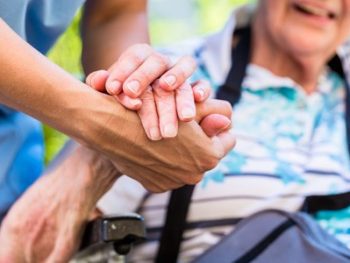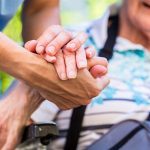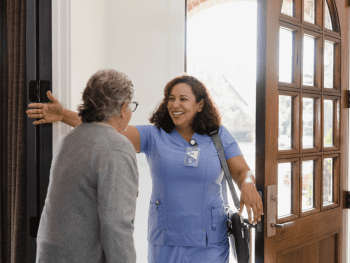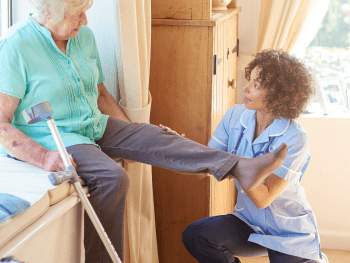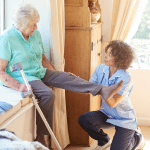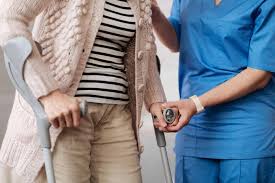July is National Sarcoma Cancer Awareness Month
July is National Sarcoma Cancer Awareness month and Pemi-Baker Hospice & Home Health (PBH&HH) would like to shed some light on this cancer and how their Palliative & Hospice team can help those affected. Sarcomas are cancers that arise from the cells that hold the body together. These could be cells related to muscles, nerves, bones, fat, tendons, cartilage, or other forms of ‘connective tissues.’ There are hundreds of different kinds of sarcomas, which come from different kinds of cells.
According to the Sarcoma Foundation of America, sarcoma accounts for 1% of adult cancers diagnosed in the United States and 15%-20% of childhood cancers. Every cancer treatment can cause side effects or changes to your body and how you feel. For many reasons, people do not experience the same side effects even when they are given the same treatment for the same type of cancer. This can make it hard to predict how you will feel during treatment.
As you prepare to start cancer treatment, it is normal to fear treatment-related side effects. It may help to know that your health care team will work to prevent and relieve side effects. Doctors call this part of cancer treatment “palliative care” or “supportive care.” It is an important part of your treatment plan, regardless of your age or the stage of disease. Pemi-Baker Hospice & Home health offers free consultations to explain the benefits of having a Palliative Care team on your side. This can be done over the phone or in person.
Coping with physical side effects
Talk with your Pemi-Baker Palliative health care team regularly about how you are feeling. If they know how you are feeling, they can find ways to relieve or manage your side effects to help you feel more comfortable and potentially keep any side effects from worsening.
Sometimes, physical side effects can last after treatment ends. Doctors call these long-term side effects. They call side effects that occur months or years after treatment, late effects. Treating long-term side effects and late effects is an important part of survivorship care.
Hospice care for cancer patients is a special kind of care that provides comfort, support, and dignity at the end of life, typically when you or your loved one’s life expectancy is six months or less. Hospice cares for the whole person, addressing physical, emotional, social, and spiritual needs.
Coping with emotional and social effects
You can have emotional and social effects after a cancer diagnosis. This may include dealing with difficult emotions, such as sadness, anxiety, or anger, or managing your stress level. Sometimes, people find it difficult to express how they feel to their loved ones. Some have found that talking to PBH&HH’s social workers or chaplain can help them develop more effective ways of coping and talking about cancer.
Caring for a loved one with cancer
Family members and friends often play an important role in taking care of a person with sarcoma. This is called being a caregiver. Caregivers can provide physical, practical, and emotional support to the patient, even if they live far away.
Caregivers may have a range of responsibilities on a daily or as-needed basis, including:
- Providing support and encouragement
- Talking with the health care team
- Giving medications
- Helping manage symptoms and side effects
- Coordinating medical appointments
- Providing a ride to and from appointments
- Assisting with meals
- Helping with household chores
- Handling insurance and billing issues
It is important to care for yourself as well as your loved one with cancer. Caregiver burnout is very common but PBH&HH can help through their free ‘Caregiver conversation, education & support group’ held the first Wednesday of every month from 10am-11:30am. You can join the support group in person at their facility on Boulder Point Drive or by Zoom. Pre-registration is required through Guy Tillson, Chaplain at gtillson@pbhha.org or by calling 603-536-2232. We hope you will join us!
With over 55 years of experience, serving clients from 29 towns in central and northern New Hampshire, Pemi-Baker Hospice & Home Health is committed to creating healthier communities. Services include at-home healthcare (VNA), hospice and palliative care, and Community Programs including: American Red Cross CPR/AED/FA, Caregiver Support Groups, Grief and Bereavement Support Groups and Ask-A-Pemi-Baker Nurse senior center programs. Providing compassionate care with experienced staff who are trained, certified professionals in the business because of their hearts. In your time of need, we’re right where you need us.
Pemi-Baker is located at 101 Boulder Point Drive, Suite 3, Plymouth, NH. To contact us please call: 603-536-2232 or email: info@pbhha.org Like our Facebook Page: @pemibakerhospicehomehealth



 Air-conditioning is important when it is hot and humid outside. If you do not have air-conditioning in your home, go somewhere that does. A movie theater, the mall, a friend or family member’s home or a community senior center are all good options. You can contact your local Area Agency on Aging for help finding a local cooling center during extended periods of extreme heat.
Air-conditioning is important when it is hot and humid outside. If you do not have air-conditioning in your home, go somewhere that does. A movie theater, the mall, a friend or family member’s home or a community senior center are all good options. You can contact your local Area Agency on Aging for help finding a local cooling center during extended periods of extreme heat.
 Signs to look for may include disorientation, dry skin, excessive tiredness, headache, lethargy, nausea, a flushed face, high body temperature, rapid pulse, dizziness and confusion. Take immediate action if you feel any symptoms coming on.
Signs to look for may include disorientation, dry skin, excessive tiredness, headache, lethargy, nausea, a flushed face, high body temperature, rapid pulse, dizziness and confusion. Take immediate action if you feel any symptoms coming on.
 Some of the auction donations are specific to palliative and hospice services including: therapeutic massage, hospice and dementia comfort cubs, therapeutic music and hospice comfort kits.
Some of the auction donations are specific to palliative and hospice services including: therapeutic massage, hospice and dementia comfort cubs, therapeutic music and hospice comfort kits.



 “We are always looking for wonderful people who have a passion for working with others. Our volunteers are so important to our non-profit organization and to those families we serve,” said Shannon Cassidy, Hospice Volunteer Coordinator for PBH&HH.
“We are always looking for wonderful people who have a passion for working with others. Our volunteers are so important to our non-profit organization and to those families we serve,” said Shannon Cassidy, Hospice Volunteer Coordinator for PBH&HH.


 Caregivers provide help with daily essentials along with the physical and emotional support needed by our loved ones late in life. But do we ever stop to take care of the caregiver? How often do we say “thank you” for being there for our loved ones, our clients, and the most defenseless in society? When do we take the time to ask how the caregiver is doing? Care-giving can be a gratifying experience but can also cause a great deal of stress. While caring for and focusing on another, a caregiver can neglect their own health, causing harm over time. Therefore, it is essential to provide tools and resources to help manage stress. If a caregiver doesn’t care for themselves, they can’t care for someone else.
Caregivers provide help with daily essentials along with the physical and emotional support needed by our loved ones late in life. But do we ever stop to take care of the caregiver? How often do we say “thank you” for being there for our loved ones, our clients, and the most defenseless in society? When do we take the time to ask how the caregiver is doing? Care-giving can be a gratifying experience but can also cause a great deal of stress. While caring for and focusing on another, a caregiver can neglect their own health, causing harm over time. Therefore, it is essential to provide tools and resources to help manage stress. If a caregiver doesn’t care for themselves, they can’t care for someone else. Make sure you take time on February 18th to honor the people who care for our most vulnerable population. For example, you could give cards with encouraging words of appreciation or a small gift to show gratitude. You can also honor caregivers on social media using the hashtag #nationalcaregiversday and let people know what makes them special. Here are some suggestions for a small gift to the caregivers in your life:
Make sure you take time on February 18th to honor the people who care for our most vulnerable population. For example, you could give cards with encouraging words of appreciation or a small gift to show gratitude. You can also honor caregivers on social media using the hashtag #nationalcaregiversday and let people know what makes them special. Here are some suggestions for a small gift to the caregivers in your life: The
The 
 Adults, young adults, and in some cases mature teens from all backgrounds, experiences, and cultures. Effective hospice volunteers embrace the fact that their role is one of compassionate service.
Adults, young adults, and in some cases mature teens from all backgrounds, experiences, and cultures. Effective hospice volunteers embrace the fact that their role is one of compassionate service.